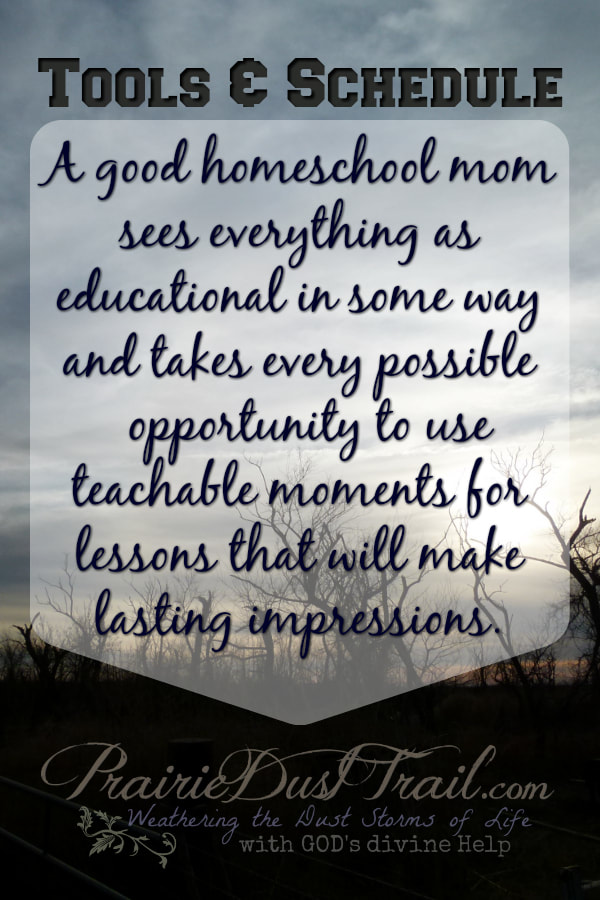Schedule, Routine & Tools for Homeschooling
Rather than trying to implement a strict schedule, focus on a flexible routine.
Below is the order I prioritize our school days and the tools I use. Bible, Reading, Writing, and Math are the basics done every school day. The other subjects oscillate depending on what project or study we are on.
I concentrate on particular things each month or season, like US Government at election time and biology in summer when they have bugs and plants to study. Sometimes I find a fun Unit Study or Lapbook I want to try with them and we will just concentrate on it until we are done. If the children ask how babies are made, we will spend a week watching Dr. David Menton’s Fearfully and Wonderfully Made videos.
I concentrate on particular things each month or season, like US Government at election time and biology in summer when they have bugs and plants to study. Sometimes I find a fun Unit Study or Lapbook I want to try with them and we will just concentrate on it until we are done. If the children ask how babies are made, we will spend a week watching Dr. David Menton’s Fearfully and Wonderfully Made videos.
A good homeschool mom sees everything as educational in some way and takes every possible opportunity to use teachable moments for lessons that will make lasting impressions. {click to tweet}
Other than the basics, most “school” happens very naturally.
Schedule - I do not implement a specific schedule any more. The cows will always get out the day I try. Our children just know those basics need to be done sometime after breakfast and before dinner time. A typical school day MIGHT look something like this:
Time Management - Our children aren’t allowed to play until the basics and chores, both inside and outside are done. The basics can usually be done in 2-3 hours. I don't generally spend more than 15-20 minutes on each subject, depending on the age and attention span of the child. I do have dawdlers that spend hours on a disliked subject, but I don't worry if they aren't getting frustrated trying to figure something out. Daydreaming does bother me, but they eventually figure out that they miss out on fun stuff if they piddle too long. Again I do not allow them to play until they are done. If they do not finish, they do not play. Yes, we have had days (and even weeks) when a child had no designated 'play' time and missed out on play dates with other families. Learning consequences is an important part of life. Some children learn it easier than others. Don't take it personally. Stand firm, be as consistent as you possibly can, and remember this season will end.
School Days - We school five days a week except holidays, sick days, beautiful days, and days the cows get out. We also seldom get visitors, so that is considered a holiday. We school on snow days, blistering hot days, and otherwise typical Oklahoma windy days. I have done 4 day school weeks but found they had more trouble getting back into the groove of the school day. I have also done 6 day school weeks when we had years that we needed a lot of extra time off for medical issues or something.
Independent Study - Our children start self-paced independent study as soon as they are able. Each one is different. I’ve had a few that could work on Math alone several years before Reading and a few that could read alone long before they didn’t need my constant attention in math. They check their own work. I look over everything every so often and tweak things as I see need. I try to always be available to help if needed but the goal is for them to work independently.
Schedule - I do not implement a specific schedule any more. The cows will always get out the day I try. Our children just know those basics need to be done sometime after breakfast and before dinner time. A typical school day MIGHT look something like this:
- Dress, make bed, brush teeth and hair.
- Breakfast & Bible study
- Morning Chores
- Home Economics - Dishes or Swap Laundry
- Agriculture & PE - Feed & Water Animals
- Reading
- Math
- Morning Chores
- Lunch
- History or Science
- Arts & Crafts, Music, or Workshop
- Foreign Language
- Supper
- Family Time - Usually with a Character, History, or Science read aloud, audio, or video.
- Bed
Time Management - Our children aren’t allowed to play until the basics and chores, both inside and outside are done. The basics can usually be done in 2-3 hours. I don't generally spend more than 15-20 minutes on each subject, depending on the age and attention span of the child. I do have dawdlers that spend hours on a disliked subject, but I don't worry if they aren't getting frustrated trying to figure something out. Daydreaming does bother me, but they eventually figure out that they miss out on fun stuff if they piddle too long. Again I do not allow them to play until they are done. If they do not finish, they do not play. Yes, we have had days (and even weeks) when a child had no designated 'play' time and missed out on play dates with other families. Learning consequences is an important part of life. Some children learn it easier than others. Don't take it personally. Stand firm, be as consistent as you possibly can, and remember this season will end.
School Days - We school five days a week except holidays, sick days, beautiful days, and days the cows get out. We also seldom get visitors, so that is considered a holiday. We school on snow days, blistering hot days, and otherwise typical Oklahoma windy days. I have done 4 day school weeks but found they had more trouble getting back into the groove of the school day. I have also done 6 day school weeks when we had years that we needed a lot of extra time off for medical issues or something.
Independent Study - Our children start self-paced independent study as soon as they are able. Each one is different. I’ve had a few that could work on Math alone several years before Reading and a few that could read alone long before they didn’t need my constant attention in math. They check their own work. I look over everything every so often and tweak things as I see need. I try to always be available to help if needed but the goal is for them to work independently.
Disclosure: Purchasing products through the affiliate links on this page contributes to the success of this site at no extra cost to you.
Bible:
Reading:
Math:
History:
Science:
Workshop / Home Ec:
Art / Music (Hymn Study):
Foreign Language:
Is there anything you would add or have questions about? I love hearing from my readers! Please feel free to contact me.
- Preschool- NEST Family Entertainment DVDs.
- Elementary- Rod & Staff Publications Readers.
- Junior High- Bible and Journal for copying scriptures.
- High School- Bible, Devotional or Theological study, and Journal for study thoughts.
Reading:
- Preschool- Teach Your Child to Read in 100 Easy Lessons 15 minutes a day.
- Elementary- Rod & Staff readers and maybe the coordinating workbooks or Learning Language Arts Through Literature when we need a change. In between the readers they get to read a fun book.
- Junior High- Classic novels and Biographies. Reading tends to overlap with History and Science.
- High- Supervised interest directed reading.
Math:
- Preschool- Dominoes
- K-12- Math-U-See is an easy program for mom with short, simple video lessons and teacher's book. The students work with manipulatives and earlier with songs so all Learning Styles are utilized for greater retention. The student work is short with only one or two dozen problems a day and one concept is mastered each week.
History:
- Preschool- NEST Family Entertainment History DVDs.
- Elementary- I LOVE Diana Waring's ‘What in the World’ series. She does such a wonderful job making history fun and engaging. I'll mix things up with a Unit Study about once a year then assign one section of Kingfisher Encyclopedia of World History a day the rest of the time.
- Junior High- I have the children read Peter Marshal’s ‘Light and the Glory’ series and biographies of missionaries. We watch the Wallbuilders American Heritage Series DVDs and listen to Heirloom Audio Productions GA Henty audio dramatizations. I like to mix things up and keep it fun.
- High School- The United States Constitution, The LAW, The Federalist and Anti-federalist Papers
Science:
- Preschool- NEST Family Entertainment Science DVDs.
- Elementary- Age appropriate biology books and DVDs. Moody Science videos and Dr. David Menton’s DVDs are both wonderful. As Bible believers, we concentrate on Creation Science during the early years.
- Junior High- Nature Study covering Physical Science, Earth Science, and Astronomy using reference books. During these years we concentrate more on the facilities of macro-evolution. Answers in Genesis is probably the leading resource for debunking evolution.
- High School- Nature Study covering Archeology, Agriculture, Chemistry, and Psychology using reference books and video teachings. During these years we have a lot of fun pursuing different 'conspiracy theories' and 'fringe science.' It is important to me that our children learn to think for themselves. With a firm foundation, they can look at things objectively and get a good, round idea of what different people around the world believe and how it all fits into our Biblical Worldview. A fun place to start is Biblically based SkyWatchTV.
Workshop / Home Ec:
- Preschool- Play-dough, wooden train set, blocks, lacing cards, kitchen toys and baby dolls.
- Elementary- Lego's and wooden train set, Cookie and Muffin baking. We have LOTS of tea parties in these years. Little Annies Book of Manners and Polite Moments booklets help teach proper manners.
- Junior High- Wood kits, Hospitality videos, and lots of cooking and cleaning. My goal has been for each of the girls to be able to cook Thanksgiving the year they turn fifteen. They teased about the boys not having to do it so the year our boys were 14 and 17, they cooked Thanksgiving together. They weren't very confident but did a great job with a simple and yummy meal.
- High School- I hate using patterns so I will start doing projects with our high schoolers without kits. I have them help me draw up plans and figure out what tools and supplies will be needed. We will do anything from building a new bunny hutch or refurbishing a piece of old furniture from a thrift store or garage sale. I tend to do at least one project a year, so the children are around this and helping throughout their lives. I concentrate on getting them to do most of one project themselves in high school. Our high school students spend a lot more time with their dad learning basic electrical wiring, small engine repair, and basic vehicle maintenance and repair. They sew a project or two. I have them scrapbook their whole childhood, one or two pages for each year. They also help me with some basic bookkeeping. I usually wait until high school before we do much of anything on the computer, then I have them each build their own website.
Art / Music (Hymn Study):
- Preschool- NEST Family Entertainment DVDs and Pictures, Kaleidescope, Viewfinder, Light Bright, Etch-a-Sketch, and quality picture books. Kids Sing Praise hymns and lots of classical music and hymns.
- Elementary- Lots of How To Draw books and tons of craft supplies. Thy Word Creations Bible memorization song books and CDs, Alfred’s Sacred All-in-One Piano Lesson books.
- Junior High- Fine Arts Study with books and art cards. Hymn Study with Then Sings My Soul series.
- High School- Digital art and commercial design and history of music and instruments around the world.
- For all ages Beyond the Stick Figure is a great all-round art program with several course options.
Foreign Language:
- American Sign Language can be taught from the very beginning. This is especially useful with late talkers. Don’t start having conniptions if you have a five year old who doesn’t talk. If he can communicate via sign language, just have his hearing checked and relax. Sign Language is also indispensable with special needs children. The program I have used for our children isn't available anymore but I found a cute series on YouTube called Signing Time that looks great for the little'ns. The older children could easily search the many videos, aps, and books available. I'm grateful to the Lord for guiding us to learn sign language since our oldest suffered sudden hearing loss at age eighteen.
- English From the Roots Up is a wonderful Latin and Greek program that will prepare the children to learn just about any language plus give them a huge advantage with English vocabulary. This is a fun program with cards that we tend to just pick up here and there for a fun change.
- I do know a little German and Spanish, which tends to fascinate the children so I teach them little bits when they are interested. The oldest perused Greek in high school and the younger ones have had fun with the DuoLingo ap on their Kindles. There are some great programs available for learning foreign languages. This TED Talk really fascinated me.
Is there anything you would add or have questions about? I love hearing from my readers! Please feel free to contact me.




